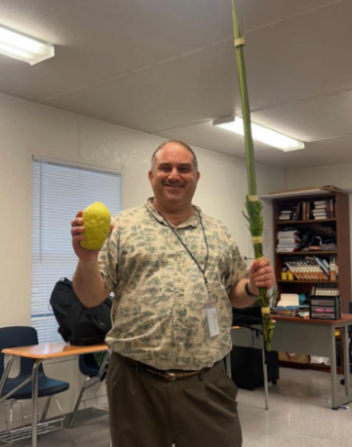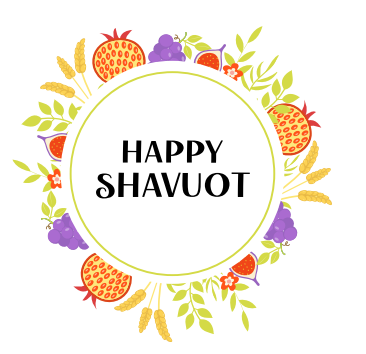Jewish Holidays are vibrant moments of spiritual reflection, traditions, customs, and joy. In the past month, the Jewish community has celebrated Rosh Hashana, Yom Kippur, and Sukkot. These occasions are far more than dates on a calendar, as they represent profound moments of spiritual introspection. In this article, five Scheck Hillel teachers share their personal experiences, providing readers with deep and meaningful insights into these traditions.
Rosh Hashanah: Welcoming the Jewish New Year
Rosh Hashanah marks the Jewish New Year and some take it as a time of sweetness and reflection. Teachers at Scheck Hillel were asked about their Rosh Hashanah customs (such as dipping apples in honey) and mitzvot (such as listening to the Shofar). Dr. Justin Rudelson, a permanent substitute, shared a creative twist on the tradition of apples dipped in honey since he and his stepson are both vegan. “We dip the apples in date jam rather than honey,” he states. 8th-grade math teacher Natalie Gurland, Jewish Studies teacher Dr. Joseph Ringel, engineering teacher Sabrina Ferster, and art teacher Lorie Offir were able to hear the shofar (more than once) and eat apples dipped in honey!
Teachers shared their goals and aspirations for the new Jewish year. Dr. Rudelson spoke of his desire to connect globally, emphasizing: “I wish to build meaningful relationships with fellow faculty members at Hillel and friends from around the world.” Mrs. Gurland and Dr. Ringel emphasized the importance of introspection and self-improvement during the new Jewish year. Lorie Offir stated: “I think continuing my practice of [adhering to] Jewish and world values and following traditions with extra heart and meaning is what I want to do this year.” Also, Mrs. Ferster said that she would like to “Be more patient and loving with my students.”
Yom Kippur: A Day of Repentance
Yom Kippur, the Day of Atonement, stands as the holiest day in the Jewish calendar. The day is marked by deep contemplation, fasting, prayer, and repentance. Boys and girls above Bar/Bat Mitzvah age are obligated to fast. The main reason for fasting is to seek repentance and a deepened connection with God. Teachers thought that Yom Kippur was a time to think about their true Jewish identity and to become holier versions of themselves. Dr. Ringel said: “I believe the purpose of fasting is to get you to a different spiritual plane.” As Jews, we are always connected to Hashem, but when we fast, we are somewhat closer. Yom Kippur is not merely a day of refusing food, but a profound spiritual journey that all the Jews take together.
Teachers shared their fasting experiences, highlighting the spiritual significance of the practice. All teachers interviewed found the fast to be relatively manageable, with thirst being the primary challenge. Natalie Gurland shared: “I’m always more thirsty than hungry; the only time I felt the need to drink or eat was closer to the end of the fast.” Food and water are an essential part of the human cycle, so it’s normal to feel funny after a day without them. Mrs. Ferster commented that she faced no issues while fasting this year.
Although some fast with ease, some aren’t able to complete the fast at all. Dr. Rudelson mentioned that he was unable to finish the fast due to medical reasons. Many Jews face this issue, but as long as a Rabbi confirms that you are not allowed to fast, then you are excused.
Sukkot: A Time to Celebrate
Sukkot is the Jewish “Festival of Happiness,” which marks the harvest season and commemorates the Jewish journey through the wilderness. Shaking the Lulav and Etrog during Sukkot is a cherished mitzvah in Judaism. Like many Jewish practices, shaking the four species has much symbolic meaning. Teachers embraced this mitzvah with enthusiasm. Lorie Offir said that she shook the Lulav and Etrog once, whereas Joseph Ringel engaged in this practice multiple times: “I shook it at Shul in the morning a few times and some in the Sukkah.”
When asked about the mitzvah of being happy during Sukkot, Dr. Rudelson replied: “I believe I have fulfilled this mitzvah. I think it’s a mitzvah to choose to be happy every single day – even in times when your heart is hurting – and to thank God you’re alive.” Even amidst challenges, Natalie Gurland shared how “The recent holiday presented some difficulties, but as a whole, it was a positive experience.”
The joy of Sukkot helped show these teachers the importance of resilience. They sought happiness despite the difficulties brought on by Israel’s war with Gaza. Teachers shared stories from their time in the Sukkah. Sabrina Ferster’s happiness stemmed from her husband’s creation of a beautiful sukkah where guests gathered, while Lorie Offir recounted a memorable incident, saying: “We sat in the sukkah and it rained on us and we laughed it off.” These inspiring stories illustrate that teachers not only embrace the mitzvah of happiness but also discover deep meaning and joy in their Sukkot celebrations, even if obstacles are in the way.
The diverse experiences of Scheck Hillel teachers highlight the depth of Jewish tradition and the resilience of the Jewish community. These experiences act to remind readers of the eternal spirit that festivals give to the world.





